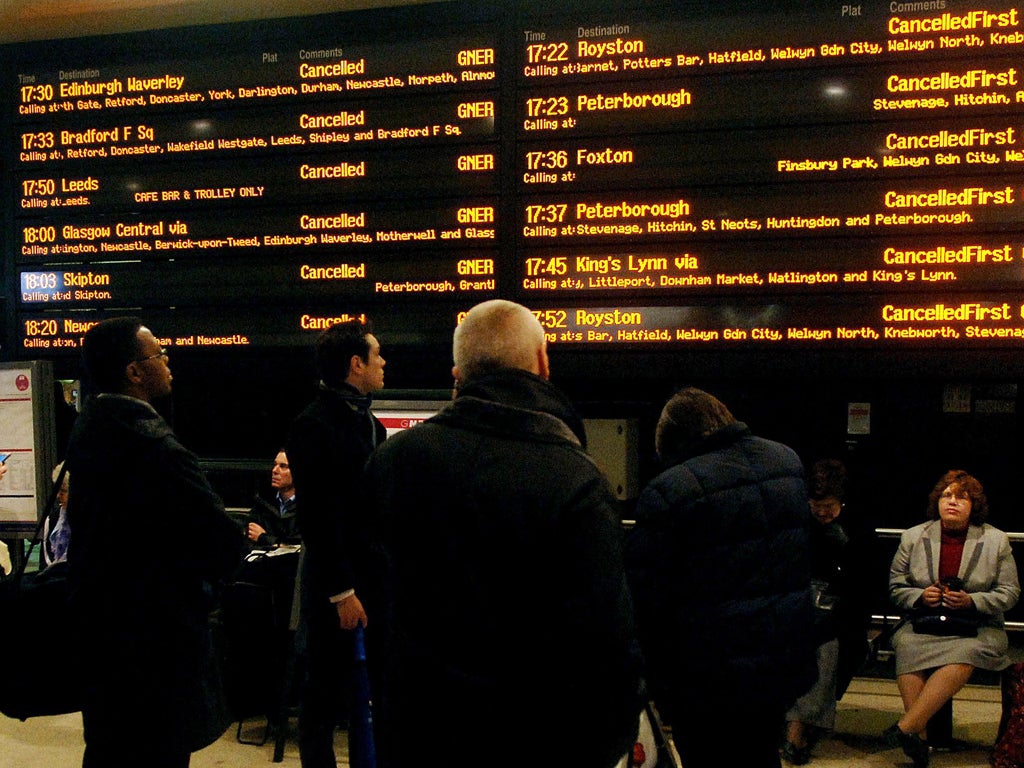The train on platform 2 has already departed. Why? Leaves on the line

Your support helps us to tell the story
From reproductive rights to climate change to Big Tech, The Independent is on the ground when the story is developing. Whether it's investigating the financials of Elon Musk's pro-Trump PAC or producing our latest documentary, 'The A Word', which shines a light on the American women fighting for reproductive rights, we know how important it is to parse out the facts from the messaging.
At such a critical moment in US history, we need reporters on the ground. Your donation allows us to keep sending journalists to speak to both sides of the story.
The Independent is trusted by Americans across the entire political spectrum. And unlike many other quality news outlets, we choose not to lock Americans out of our reporting and analysis with paywalls. We believe quality journalism should be available to everyone, paid for by those who can afford it.
Your support makes all the difference.Autumn may have arrived late, but the trains should be more punctual as rail companies use a new tactic in their battle against the seasonal blight of leaves on the line: Earlier trains.
Several operators have braced themselves for delays by releasing "leaf-fall timetables", with many services running early to compensate for slow progress on leaf-strewn tracks.
South West Trains announced changes last week to services on some of the main commuter routes into London, which came into effect on Sunday.
Rush-hour trains into the capital from Reading, Portsmouth, Weymouth and other stations have had their departure times pushed forward.
"Leaves falling on the rails are crushed by passing trains to make a slippery film," South West Trains said. "This makes it harder for trains to accelerate away from stations and means our drivers have to approach station stops more slowly. Network Rail run special rail cleaning trains but these can only reduce, not completely eliminate, this problem." The company said it had run altered autumn timetables since 2004. National Express, Southern and Chiltern trains also released new "leaf-fall" times.
Network Rail said that the problem of leaves on the line was one that would not go away, but was being dealt with by cutting back trees on the worst-affected routes as part of a "vegetation management programme".
The Campaign for Better Transport said that it received complaints from passengers every year about the issue. Many commuters were baffled that fallen leaves could stop a train.
Alexandra Woodsworth, public transport spokesman for the Campaign for Better Transport, said: "We need much better information around these timetable changes. SMS Texts and email updates are an effective way of keeping passengers informed. A lot of the train operating companies could do a lot better in this respect."
A spokeswoman for South West Trains said: "In common with other train operators, for a number of years we have introduced a slightly amended autumn timetable to minimise the impact of leaf-fall on the tracks. This is nothing new. It affects only around a fifth of our daily services and impacts journey times by an average of just two to three minutes."
Anthony Smith, Passenger Focus chief executive, said: "We welcome leaf-fall timetables if they provide passengers with a more realistic timetable on which to plan their journeys. However, it is essential that it is well publicised and that all information given to passengers during this period is accurate."
Join our commenting forum
Join thought-provoking conversations, follow other Independent readers and see their replies
Comments